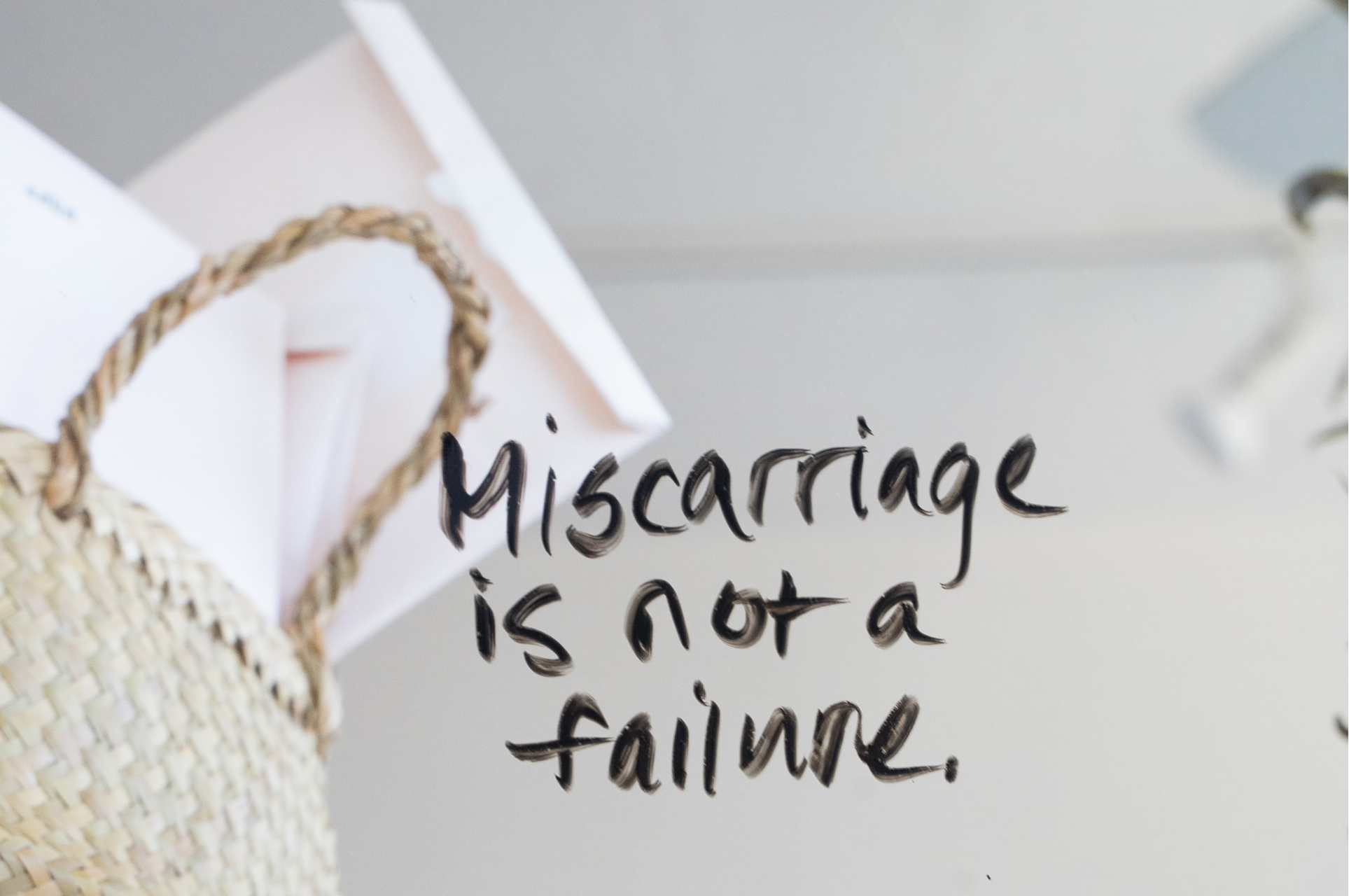Miscarriages are common, but they are still incredibly difficult to experience. It’s totally normal to feel overwhelmed, especially if you’ve never experienced pregnancy loss before. Remember that you’re not alone & there is help available.
How to deal with a miscarriage
One in five pregnancies end in miscarriage which is defined as a spontaneous loss of a pregnancy prior to 20 weeks gestation. Many women and their partners are affected, with one in ten women experiencing a miscarriage in their lifetime.
The physical and emotional symptoms after a miscarriage can be tough to cope with. Although reasonably common, this does not take away from the devastating impact a miscarriage can have on you and your partners emotional health during this difficult period.
Emotional response following a miscarriage
The emotional response to the loss of a pregnancy can result in a rollercoaster of numbness, disbelief, anger, and guilt. Feelings of anxiety and depression can occur and may be impacted by hormonal changes you might be experiencing or a history of loss and grief of previous pregnancies or assisted fertility losses. A feeling of pure overwhelming sadness and long episodes of tears and increased emotions are common.
Some women will also experience an ongoing physical response related to their emotional wellbeing. The changing levels of hormones will also be associated with the physical changes the mother will experience, and will often be associated with fatigue, poor sleep patterns, poor appetite and related loss of energy.
Sharing the loss with family and friends can often increase the feeling of loss and what the couple had visualized in looking forward to as a family and sharing with others in the future.
Key Highlight
Pregnancy loss can result in a range of intense emotions, including sadness, disbelief, anger, and guilt. You may also experience anxiety and depression. These feelings can be exacerbated by hormonal changes or a history of loss and grief. It’s common to feel overwhelmed by sadness during this period.
Grief
Pregnancy loss can lead to grief not only for the loss of the pregnancy but for the loss of what each couple was looking forward to as parents. The profound impact of grief affecting women and men following the loss of an early pregnancy is highly underestimated.
This grief can also be impacted by the comments of other people, the often well intended comments such as “maybe it was for the best”, or “you can always try again” can be devastating as this fails to appreciate and acknowledge the feelings of loss and need to grieve for the lost baby.
Loss of trust in your body
This can also be associated with feelings of anger or frustration and a “why my body, why my pregnancy’. A feeling of being let down by your own body, and that it won’t work, or will this happen to me/us again are genuine feelings at this time and can be magnified if this isn’t the first experience of loss.
Talking about these feelings can be beneficial. Seeking professional medical advice and reassurance is a good starting point, particularly when there may be a medical reason for the miscarriage which you have no control over.
Loss of control
The loss of control can be associated with anger and frustration, along with a loss of trust in your physical health and why did this happen to me?
This can also relate to the emotional loss of control you may be experiencing which may be very alien to you. This can be even more difficult and overwhelming if you have experienced several experiences of loss previously and you are now faced with making big decisions about pursuing attempts for further pregnancies. Take your time in these decisions, be kind to yourself, allow time to heal and process these feelings for you and your partner.
Failure and guilt
Some women experience feelings of failure that they haven’t been able to proceed to term in their pregnancy. Feelings of guilt can relate to questioning “could I have done something different this time?”, “did I eat something wrong?” that caused this or simply, “could I have prevented this from happening?”. It’s common to feel fine one day and awful the next. Sharing experiences with other women who have been through similar experiences can be reassuring.

Fear
The emotional expression and associated feeling of fear can be associated with “could this happen again next time we try?”. This is an understandable emotional response when you have experienced such a great loss.
Talking about these feelings can be helpful in order to access additional support should you require it if you proceed with planning another pregnancy.
Jealousy
While every person will process pregnancy loss differently, the range of emotions can include: grief, hopelessness, sadness, guilt, anger and jealousy. It can be quite normal to experience feelings of jealously towards others, especially other parents and those with young babies. The feeling of it not being fair, and why can others (friends, family, partners) have a baby with ease and not experience the loss of a pregnancy are difficult to understand, but are part of the grieving process.
Loneliness
There can be intense feelings of loneliness after pregnancy loss, which will be heightened if there are a lot of parents or new parents in your social circle. This may leave those grieving a loss feeling like they don’t have anyone who understands what it feels like to be alone after the loss of a pregnancy, and to no longer be carrying your baby. Allowing yourself to grieve whilst seeking out support through a trusted friend or family member can provide some comfort. Explaining to them the sense of emptiness you feel now that you are no longer pregnant with your baby can help them understand your situation and assist with coping mechanisms.
Confusion
In addition to the trauma and stress involved in dealing with an early miscarriage may be accompanied by feelings of confusion. “Why has this happened?”, and feelings of it not being fair when you have done everything right and have followed all of the recommendations is a natural reaction and cannot be underestimated.
Key Highlight
The physical aftermath of miscarriage
Your physical recovery following pregnancy loss is also a very personal journey, and may include differing symptoms and experiences depending on the gestation of your lost pregnancy. The physical symptoms will include bleeding, nausea, cramping and discomfort for up to two weeks. If bleeding persists or pain increases it is important to seek professional medical advice.
Some women even experience physical symptoms from their emotional distress, such as fatigue, trouble sleeping, difficulty concentrating, loss of appetite and frequent crying. The changing hormones that occur after miscarriage may intensify these symptoms.
Depending on the way your miscarriage occurred, you may also experience additional symptoms, which may include post–surgery effects. If you experience any unusual physical symptoms, you should seek medical treatment immediately. Depending on your gestation at the time of your miscarriage you may have other symptoms including breast changes, this in itself can be additionally distressing for you.
A medical review approximately 6 weeks after your miscarriage is encouraged to check on your physical health. At this check up your doctor may suggest tests to provide reassurance about your wellbeing and health if you feel ready to plan a future pregnancy. Although your fertility should return following an early miscarriage, if you don’t want to plan a pregnancy straight away, give consideration to your contraception needs.
Mental health problems
After miscarrying, the elevated hormone levels that woman experience take a sudden plunge. This can contribute to significant emotional changes, with common symptoms including fatigue, anxiety, depression and irritability. These changes, along with other associated emotions such as sadness and grief, can make any existing mental health symptoms worse.
It is important to be aware of these changes and to reach out to a health care professional if concerns arise.

Supporting your partner after miscarriage
The loss of a pregnancy can have great impact on your partner who may feel unsure in how to respond or react, or not sure what to do to support his partner.
It is normal to reassure your partner that their feelings of loss, heightened emotions, anger and sadness are normal. Talk about how you are both feeling and how you can best support one another. Don’t feel you have to rush to recover, it may be that you navigate this process of grief together on a daily check-in basis and may recover at differing paces.
It may be helpful to have some time together, to connect and work through your grief together. Some partners prefer to access grief counselling separately as they find it easier to speak with a stranger rather than show their vulnerability to their partner who they are trying to be strong for.
To support one another, you may find doing activities together which provide an opportunity to talk, such as going for a walk, can be helpful. If other children are in the home it may be working out how you share and manage their care through this time.
Key Highlight
Grief is a complex process and mourning the death of a loved one, especially a child, can be an overwhelming experience. Some couples prefer to take time away from each other and grieve independently, while others find that going through grief together is often less stressful — allowing them to connect on a more personal level.
Seeking out support groups
Seek help from a therapist or medical professional. Services available to support you during this challenging time include:
- ForWhen – 1300 24 23 22
- PANDA (Perinatal Anxiety & Depression Australia) — 1300 726 306
- COPE
- Raising Children Network
- SANDS
Long-term recovery
This may include different ways of supporting you individually and as a couple, and may relate to your physical health and emotional wellbeing.
- Introduce regular opportunities for self- care into your daily routine;
- Exercise including healing yoga such as “Yin or Slow flow’ classes may be helpful;
- Meditation can also be helpful to allow for healing;
- Art and therapies to support your emotional wellbeing through expression;
- Journaling, with time and healing may allow you to remember little moments and experiences of your pregnancy.
Talking about your experience with who you trust and feel safe to share with. You may find talking to friends and family members who have also experienced loss and in sharing your experiences, you access additional support together.
Some parents choose to plant a tree or have a special place they go to in memory of their loss. This can sometimes be a very personal expression which only you as a couple know about.

Getting pregnant again after a miscarriage
Some parents have a sense of urgency to become pregnant again. This can be for a variety of reasons including the need to fill the painful void of the loss of your last pregnancy with a hope for future pregnancies. This may also relate to timeframe, age of the parents, and in the experience of assisted pregnancy. It can also be about the need to have some belief that your body can do this.
This is a very personal decision but should also be guided with support of your emotional and physical health and readiness for pregnancy. During this time keep in mind your well-being and ensure you are resting, prepared as much as you can by accessing good nutrition and emotional preparation for your future pregnancy.
Consider seeking medical advice or mental health support if you have questions, this is strongly encouraged especially if you have experienced up to three miscarriages.
Taking care of your physical and emotional and medical wellbeing are of primary importance whilst giving consideration to how you want to remember this pregnancy and loss experience.
Frequently Asked Questions
See below our answers to some of the most commonly asked questions we receive about miscarriage.
Try not to blame yourself or your partner.
Don’t feel that you have to rush in your recovery from this distressing experience.
You will be discouraged from swimming or having sexual intercourse before your bleeding has ceased.
You should keep in mind what you have experienced and that you may have physical and emotional impacts for a little while. Take care of your health and wellbeing as you recover, it’s important to acknowledge what you have been through.
Some parents will say they will never feel normal again and this will depend on how your emotional wellbeing is following the loss of your pregnancy.
Some parents feel that planning another pregnancy can be helpful to move forward together, however don’t feel rushed in making this decision, this is your choice when you both feel physically and emotionally prepared.
Physically your body will heal and can be prepared for another pregnancy, but acknowledging how you feel will also help you know when you are ready.
This is a very personal decision and can be impacted by your coping skills and the supports around you, however if you feel ready or open to counselling it can be very beneficial to talk to someone and loss of pregnancy support counselling can be very helpful. Some parents can be affected by anxiety and depression for longer periods and can access professional support to meet their personal needs.
For parents who are accessing assisted pregnancy support counselling will usually be available through the clinic they are attending.
There is no standard home treatment for a miscarriage, as the best course of action depends on the individual situation. Some recommended home treatments include rest, heating pads, and over-the-counter pain medication. If the bleeding is heavy, however, it is best to seek professional medical help.
After a miscarriage, you can usually expect your first period to arrive four to six weeks later. In most cases, it is safe to start trying to conceive again after one normal menstrual cycle.
However, there may be times when your doctor recommends that you have some additional testing done before getting pregnant again, in order to determine the cause of the previous miscarriage.

